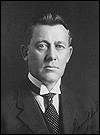James Thomas Milton Anderson
James Thomas Milton Anderson (born July 23, 1878 in Fairbank , Ontario , † December 29, 1946 in Saskatoon , Saskatchewan ) was a Canadian politician and teacher . He was Prime Minister of Saskatchewan Province from September 9, 1929 to July 19, 1934. He was also chairman of the Conservative Party of Saskatchewan from 1924 to 1936 .
biography
Anderson trained as a teacher and taught for six years in various locations in the province of Ontario . In 1906 he moved first to Manitoba , then on to southeast Saskatchewan , where he taught in Melville and Grenfell . He married Edith Redgewick and had a son and a daughter with her. In 1911 he was appointed school inspector in Yorkton . In addition to his school activities, he studied education at the University of Manitoba and the University of Toronto .
In 1918 the government of William Melville Martin appointed him director of education in the capital, Regina . His main job was to ensure that all immigrant children were taught in English . But after four years he was dismissed for political reasons, whereupon he joined the small Conservative Party of Saskatchewan . This appointed him in 1924 as its chairman. In 1925, Anderson was one of three Conservatives elected to the Saskatchewan Legislative Assembly.
As a result of corruption scandals, the Saskatchewan Liberal Party , which had ruled uninterruptedly since 1905, lost the 1929 elections. Although the Liberals had narrowly won the most seats, the clearly strengthened Conservatives succeeded in winning individual Independents and the Progressive Party to their side Form coalition. On September 9, 1929, Anderson took over the post of Prime Minister and that of the Minister of Education.
The opposition liberals accused Anderson of working closely with the Ku Klux Klan , which at the time had around 25,000 members in Saskatchewan. Only a few colored people lived in the province and the Indians had been almost completely forced into reservations. For this reason, the clan stirred up hatred against immigrants, Catholics and French-Canadians - groups that were mostly addressed by the liberals. Anderson denied the allegations but passed a new school law that banned the use of French and the display of religious symbols.
Anderson's government had to deal with the consequences of the Great Depression and the Dust Bowl deal that the major economic sector of the province, the Agriculture , almost brought to a standstill. The countermeasures introduced by the government were largely ineffective. In 1931 the RCMP violently broke up a miners' strike organized by communists in Estevan , in which three strikers were killed.
In the elections in June 1934, not a single parliamentarian who had belonged to the ruling coalition was re-elected. Anderson remained in office until July 19, 1934, two years later he also gave up the chairmanship of the party to John Diefenbaker . He then ran an insurance company until 1944, then the school for the deaf and dumb in Saskatoon until his death .
literature
- Gordon Barnhart : Saskatchewan Premiers of the Twentieth Century. Canadian Plains Research Center, Regina 2004. ISBN 0889771642 .
Web links
- James Anderson ( English, French ) In: The Canadian Encyclopedia . Retrieved March 22, 2015.
- Article by James Thomas Milton Anderson in the Encyclopedia of Saskatchewan
| personal data | |
|---|---|
| SURNAME | Anderson, James Thomas Milton |
| BRIEF DESCRIPTION | Canadian politician |
| DATE OF BIRTH | July 23, 1878 |
| PLACE OF BIRTH | Fairbank , Ontario |
| DATE OF DEATH | December 29, 1946 |
| Place of death | Saskatoon , Saskatchewan |
